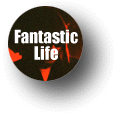

Refrigerator -
Louder Than Goodbye 7" EP
|
Refrigerator Article in Puncture #41, Spring 1998 by Franklin "the King" Bruno "WE'RE ALL TANGLED UP AGAIN." Allen Callaci says it at the end of the chaotic live version of Bruce Springsteen's "State Trooper" that ends Refrigerator's 1991 vinyl-only 33 1/3 Long Play ( on Eighteen Wheeler). Every time I hear it, I picture Allen lying on the makeshift stage at Munchies' (the sandwich shop, now a Subway, that helped midwife the so-called "Shrimper scene" in Pomona, CA that helped midwife the so-called "Shrimper scene" in the early '90's), shirt off, wrapped up in a microphone cord. It also reminds me that there's no way for me to write about this band or the people in it without owning up to connections between our lives, musical and otherwise. So: Brothers Allen and Dennis Callaci (vocals and guitar, respectively), like myself, grew up Italian-American in Upland, a former citrus town about 40 miles east of Los Angeles. (We went to different schools, and didn't meet until Dennis started working at a local record store.) Nothing Painted Blue (my band) and I have released tapes on Shrimper, Dennis' once-cassette-only label-as influential for its low-key cottage industry modus operandi as for its catalog, which includes Refrigerator's last two records, as well as releases by Sentridoh, Boston's Secret Stars, Sweden's Bingo Trappers and many local projects. Rocking Horse Loser, their first 7", was released by Jupa, a label I helped run. My band's covered their "Anti-Nomination" on record (and Allen's sung it with us on stage), and I've been known to play "Tourists," while they recorded a version of our "Epistemophilia" for a tour-only cassette. They met their newest member and first-ever bassist, Daniel Brodo, after he started playing with me. I've ended up on stage with them a few times, and it looks like I'll be playing piano on the next Refrigerator record--hell, I'm even handling extra guitar on that very version of "State Trooper," though I can't tell which bundle of treble is me and which is Dennis. Tangled up, indeed. (I didn't end up on the floor with Allen, though. At least not that time.) But enough about me. YOUNG CONFUSION: Before Refrigerator, when Allen was a senior and Dennis a sophomore at Montclair High, there were the Bux. Allen: "The first Bux tape was made December 6, 1985--it's written on the label. We released a Bux tape on that date for the next five years." Dennis: "Bucky Meadows, the guitarist in [local metal act] Angel, had a pre-Angel band called Buxx. Stealing that seemed like a good idea. The first tape was self-titled [The Bux, with one x]. We made only 4 or 5 copies. We didn't make more, or try to distribute the tapes, until '88 or so." Allen: "Dennis and the drummer were in this R & B band called Zahaba, and the singer, Joe, a guy in his mid-twenties, didn't show up for practice one day. I had drawn a phony ad for Knickers Down [the only album by the original Buxx], with fake titles like "Microwave Poodle." So I wrote a couple songs and Dennis wrote a couple songs, and we kept doing the Bux in Zahaba until we got kicked out. Dennis: "Zahaba was supposed to play at that Mexican restaurant [Don Jose's] next to Best in Montclair, but it never worked out. One day Joe left a demo track he'd recorded at our house, and Allen recorded vocals on it--"Frankenstein's House of Freaks." When we played it for him, he was disgusted and the band got broken up." Current drummer Chris Jones was around as well. "I've known Dennis since we were nine. I'd come over and play on songs when the real drummer wasn't there, I'm probably on about 40% of the Bux stuff. I wasn't so much on the music side, but I made a bunch of videotapes--30 or 40 of them, like the video for "Frankenstein's House of Freaks" where our friend Jim [Coppola, of Shrimper compilation stars Satnam Puppets] blows up at the end." As Dennis says, most of the early Bux material was made on the dub-a-few-copies-for-friends scale, though some appear on the out-of-print Shrimper tape Yeast for Veal, which alternates the alleged "worst" of The Bux with equally half-baked songs by WCKR SPGT, a darker-humored but equally prolific Inland Empire tape-outfit. (Also, a visit to Dennis' house often includes a dip into the vast Bux archives.) Listening to Yeast for Veal now, the main impression is of adolescent but free-spirited satires on mainstream rock genres, from Foreigner swagger ("Mama don't know/You're goin' to a rock 'n' roll show") to the power balladry of "Yes, I've Been In Love" ("...but I'm not anymore"). Allen, under the pseudonym I. A. Coca, uses a high, intentionally unpleasant singing voice--imagine a cartoon character based on Journey's Steve Perry. (Band members still fall into this voice for wisecracking.) Even this early on, the elements of Dennis' unique guitar vocabulary are heard, and on Hair, Nails, and Skin, a late Bux tape but one of the earliest Shrimper releases, unironic songs like the plaintive "Feeding Seagulls" prefigure what Refrigerator would become. ALL THESE BILLS AND PROBLEMS ARE PILING DOWN ON ME. Alan: "Before the Bux broke up, Dennis and I had started making tapes of different stuff we'd written that the drummer wouldn't play. There's some of that on the last Bux tape: to get him to play a slow one, we'd have to throw in five hardcore songs." Refrigerator was born in 1990-'91, when the aforementioned drummer, also an occasional housemate, kicked himself out of the band. Dennis: "Around the time our father died, our first drummer was involved in drugs. He stole a bunch of my sister's belongings, and he was kind of a coward about it. I ran into him at a comic book store later, but he never apologized. It left a bad taste. Terrible things had happened to Allen and me the year before. It was just growing up--we wanted to approach it without being silly." Asked to name the first song written as Refrigerator, Dennis mentions one about the drummer that he's not sure if they've ever released, while Allen names "Lonesome Surprize," the title track of their first cassette, mostly culled from a live set on local college station KSPC and released around the time the label was beginning to run ads in zines and get mail orders from across the country. It's a signature tune, with its descending classic-rock progression (think "You Ain't Seen Nothin' Yet" or "Sweet Home Alabama") manhandled into postpunk by Dennis' guitar, skilled-but-scattered drumming from new recruit Joel Connel, and Allen delivering, with the pleading ache of his natural voice, lyrics that seem (like much of Refrigerator's best) an oblique response to personal loss: "I stepped into my shower, feeling more wet than baptized/Here's your lonesome surprise." It's an anti-anthem, at once heartfelt and tossed-off. On the serious side, there's also the ballad "Albert Caboose" and the high-school valedictory "Class of Next Year" ("All you future leaders/All the kids you'll step on"). And there's plenty of vestigial Bux silliness in the hardcore of "F Word" and the closing cover of Prince's "Annie Xtian," and the title with its '80's-metal misspelling. Allen: "I was going between my I.A. Coca voice and my real voice. The Bux voice was totally made up--but it's how I'd been singing for five years." At its best, Lonesome Surprize has riffs and melodies insistent enough to connect emotionally despite layers of sonic haze--the band's limited if growing instrumental reach, the inexpert studio engineering, and the generation loss of Shrimper's multiple dubbing decks. TINA LIVES BY WHERE A SPEEDWAY USED TO BE: The cassette, LP, and seven-inches following Lonesome Surprize are a patchwork of Munchies' "field recordings," home-taped items, and early studio forays, studded or littered with gems and frustratingly half-baked experiments. 1993's How You Continue Dreaming (on Communion), the band's first CD, is the payoff. Individual songs may be tightly arranged ("Bicycle") or diffuse (the title track), but, against the odds, all 20 fragments hang together. The record's musical cohesion is all the more remarkable in that its percussive duties are split between the departing Joel Connel and now-permanent drummer Chris Jones. Dennis: "There was no plan for Joel to leave, he kind of got busy and lost interest at the same time. Also, we'd known Chris for so long." Chris adds, "I'd been away from the Empire at college for a few years, but I met everyone again at Dennis' bachelor party. After the wedding, I sat in on drums at a Satnam Puppets show, and Dennis asked me to fill in for Joel a few times after that." If Lonesome Surprize focused on personal losses, including that of innocence, Dreaming inscribes the same losses within the frame of social and economic changes within Upland and the nearby towns collectively known as the "Inland Empire." (This grandiose term, invented by the area's commercial interests, has been appropriated by the local music community with a mixture of sarcasm and local pride.) The Callacis (and I) have watched the last vestiges of semi-agricultural communities, largely ignored by the neighboring metropolis, be replaced by a patchwork of housing tracts and strip malls, a grab bag for land-developer greed. Orange groves turn into parking lots, wineries into burger joints, and the old Ontario Speedway into an outlet mall anchored by the country's most technologically advanced multiplex. Allen: "A lot of that came from working at the Upland Public Library and seeing old photographs of the area, and reading that book Pomona Queen [a noir novel by Kem Nunn, with key scenes set on the same block as Munchies]. I'm just writing about small things, odd moments from out here. It's like we live in L.A.'s shadow. But what people go through out here is any less important." On the gentle "Colton" and "Old City Cool" ("we know our way around here in the dark") Refrigerator vividly romanticize the area, while on the distortion-and-voice "Orange Blossom," an enraged Allen seems to embody the city itself--"Orange blossoms, dead possums...I've changed my name, and I've changed my price." And the withering put down from "Insect" ("Ain't it funny how you ended up becoming what you swore you'd never be?") could be directed at Upland itself (or Pomona or Chino) as easily as at some near-unrecognizable friend. Which, in a way, is what these cities are. YOU'RE AT THE WRONG SHOW, IN THE WRONG HOLE: If all this sounds like quite a departure from "Microwave Poodle" and "Frankenstein's House of Freaks," you've never seen Refrigerator live. Allen is a merciless ham on stage, jumping on tables, rolling on the floor, unbuttoning a loud sportshirt to show an inch or two of high-riding boxers, and generally acting out the fantasies of the lifelong Bruce Springsteen fan he is. Dennis, meanwhile, is a wisecracking loose cannon, tripping his unsuspecting brother at a moment of high arena-rock drama, turning the guitar part of any given song into feedback or scratchy, Derek Bailey-esque improvisation, and ranting about whatever comes to mind. A recent show at the Blackwatch Pub, one of the few live venues left in the Empire, found a cover of Lesley Gore's "You Don't Own Me" dissolving into Dennis' motor-mouthed counting (as in the Phillip Glass opera Einstein on the Beach), immediately followed by a tight version of "Ceiling" (from an early single), and a rocking new arrangement of the once-acoustic "Anti-Nomination," an even older song. The evening ended with a brief appearance by Allen and Dennis' rap alter ego To-N-Fro (the "Fro" being Allen's frizzy hair), an idea they've kicked around since junior high. Dennis explains, "The songs are pretty serious...performing them live, you don't want to be phony, putting forth emotions with no levity. It's fun to stretch things out and see what happens, too, though that can get to the point of being cliched....When we play, I still feel like a bastard son--at every show, I know someone there is going 'What the fuck is this?' " Their approach can be an acquired taste--I've heard people say they didn't like Refrigerator until after seeing them half a dozen times; and it can have a strange effect whenever the band make it over Kellogg Hill for a rare show in L.A. proper. Dennis' rants turn pointed, with self-aggrandizing local DJ Chris Douridas a favored target. To see Allen dance into a trendy Silverlake crowd like a warmer version of Chris Knox (a fan and occasional touring partner) is to see something brave, endearing, and unusual in rock: he's acting as he would in front of a handful of hometown friends. Chris adds: "I think the improv level is much the same whether we're playing at the Blackwatch or opening for someone at The Roxy--if we're going on a tangent, it could happen either place. If we're tired, we do it straighter: if we've been travelling all day, it might happen because we're in another town." Too bad Refrigerator hardly ever tour, despite semiannual trips up the West Coast and a week of East Coast shows with Yo La Tengo. And too bad more people don't have as healthy a view of the relationship between their bands and the rest of their lives. Dennis: "We only tour for a week a year--like guys going fishing. If we keep it to a week or 10 days, it's fun. I wouldn't mind having the chance to do three weeks scattered over a year, but with family and jobs, we couldn't do it in a block." Allen agrees: " The library has been good about giving me time off. But it's hard to get people I work with to understand the idea that we put out our CDs ourselves. They think it's either a hobby, and you play in the local bar, or you're trying to make a career out of it. Neither of those frames fit us." I SHOULD LEARN TO SURVIVE: Refrigerator's latest (self-titled) record, also on Shrimper, is another breakthrough, this time sonically. (For reasons I don't fully understand, 1995's Anchors of Bleed doesn't seem up to their usual standard.) Still recording with Inland Empire house engineer Bob Durkee, but this time on 16 tracks, the sessions don't smooth out Refrigerator's jagged edges, but fix them in rich, spacious settings. Dennis has made a science of harnessing the oddities of his aging amplifier (spray-painted POP INDUSTRY) into an eloquent range of squeals, overtones, and buzzes. It's as much an instrument as his guitar, and sounds as personal as Allen's voice. Chris' drumming seems fully integrated for the first time, supplying uncluttered but intriguing beats reminiscent of Yo La Tengo's Georgia Hubley. "Unrealized," with its slow dynamic build and shifting textures (including a banjo solo by Zorn-connected avant-guitarist Buckethead, a high school friend of Jones'), would have been unthinkable on a previous record. The songs-- from the early-Who-derived "Young Confusion" and wiry "Splitting Atoms" to the sprawling, evocative "Somehow"--are among the most fully-realized they have done. Will this newfound studio savvy distress those who think of Refrigerator as lo-fi flagwavers? Dennis doesn't think so. " I don't really think anyone thinks that way. The resistance comes from places I don't have any respect for, like Alternative Press or Option--people who got it all wrong to begin with....I think we've changed with every record. The first two are 4-track, Anchors of Bleed is 8-track, and the new one is 16-track. At first, I wanted to record things you could perform live in one take, with one guitar. But we all feel we haven't really toyed with our songs that much. With the next recordings, we'll probably have a lot of bass and piano. We don't want it to be, here's another 4-track recording--people get tired of hearing the same record." Allen: "We're harder to satisfy each time.... Now, when I'm singing, I know better what I'm trying to do. Also, when we first recorded with Bob, we didn't know that much about the studio. It was like, if we can get guitar, drums, and vocals all on four tracks, then why would we need eight?" TAKE IT SLOW, IT'S EASY: While I'm coming clean about conflict of interest, I might as well go the distance and admit that at times I envy Refrigerator a little. I envy the fact that they still live where we all grew up and played shows together, while I chose to move into L.A. for grad school. I envy (and admire) the way they've garnered some of the attention and respect they deserve without ever making a record for someone they don't respect, or inflating their egos by tossing their label's limited funds into radio and press promotion. As Dennis puts it, "We're not trying to be isolated, but we're not trying to force it down anybone's throat, or trick anybone into liking it." Dennis' actions, both with Refrigerator and with Shrimper, back this statement up. Most of all, I envy Refrigerator for the way they suggest a story, sum up a friendship, or commemorate an entire city with two chords and a few words; or the way that, live, they can be self-immolating and genuinely moving at precisely the same moment. It's a strange kind of envy, and something like love.
REFRIGERATOR MAIN PAGE • REVIEWS • DISCOGRAPHY |





